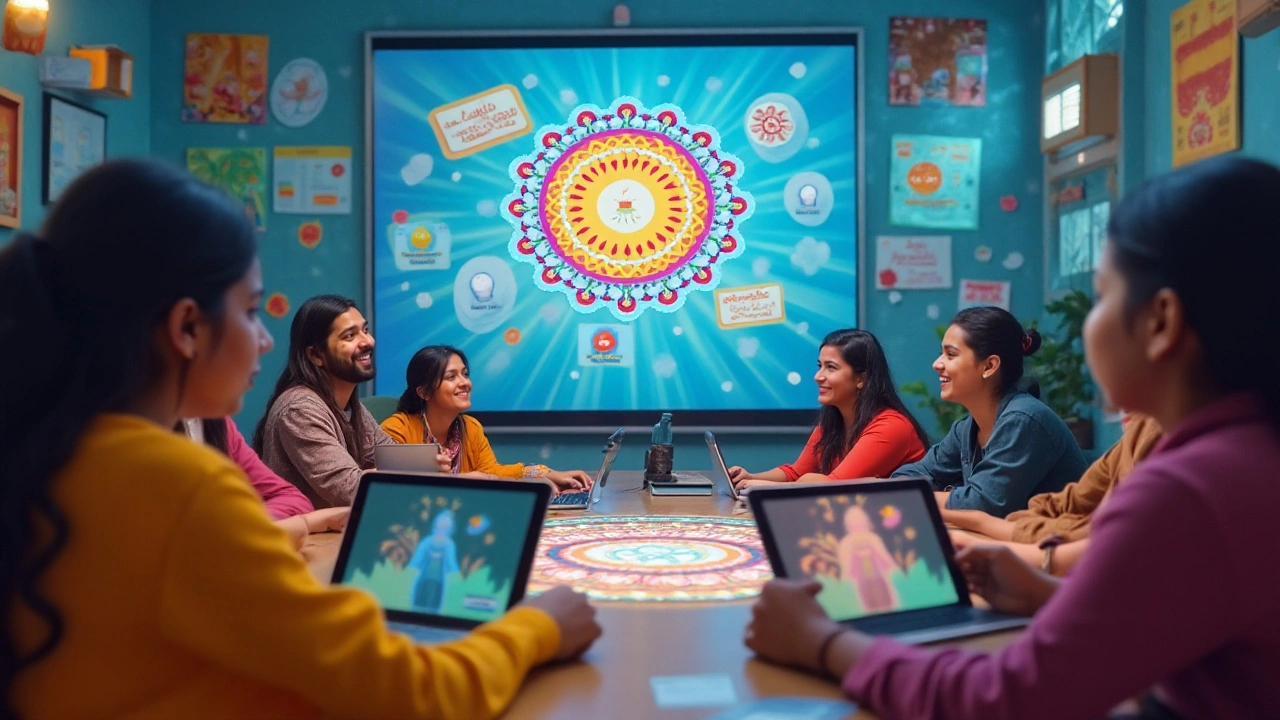Jan
21

- by Dhruv Ainsley
- 0 Comments
The world of education has seen a seismic shift, with online platforms taking center stage. They've democratised learning, making it accessible to more people than ever.
Some platforms offer immersive and gamified experiences that make learning an adventure, while others provide a wide array of courses for all types of learners.
In the midst of a digital revolution, these platforms have emerged as frontrunners, carving paths for individuals to upskill and pursue lifelong knowledge. Let's explore the top e-learning platforms that are transforming education in 2025.
- The Rise of Online Education
- Platform 1: Gamified Learning Experience
- Platform 2: Comprehensive Course Selection
- Platform 3: Specialized Learning Communities
- Platform 4: AI-Powered Personalization
The Rise of Online Education
Education is undergoing a significant transformation, with the rise of online education marking a fundamental shift in how learning is delivered. Since the early 2000s, digital platforms have chipped away at traditional classroom walls, creating online spaces where education knows no boundaries. This evolution was accelerated in recent years by both technological advancements and societal needs, prompting an unavoidable pivot towards virtual learning environments. One reason for this shift is the convenience and flexibility that digital classrooms offer. Students can now access a plethora of resources from anywhere in the world, breaking free from the confines of physical locations and rigid timetables. This accessibility has opened doors for individuals who might have once faced insurmountable barriers to education, such as geographical isolation or financial constraints.
The rise of online education can be attributed to several pivotal factors—chief among them, the technological boom. With smartphones becoming ubiquitous and the internet more accessible, learning online is as intuitive as it is expansive. As web technologies have advanced, so too have the platforms that leverage such tech to deliver content in dynamic ways. Schools and universities have embraced these new tools, integrating digital elements into their syllabi to enhance student learning experiences. Moreover, the global pandemic acted as a pressure cooker for innovation in e-learning, with an unprecedented shift to online classrooms prompting educators worldwide to adapt quickly.
According to Dr. Margaret Collins, a renowned educational technologist, "E-learning is not just about digitizing textbooks; it's about reimagining how we engage with information and with each other."Learning management systems (LMS) allow educators to create interactive coursework, tapping into multimedia to appeal to diverse learning styles. Recorded lectures, interactive quizzes, and real-time feedback are just a few avenues that these platforms have carved out. Additionally, the adoption of virtual classrooms has not been a one-size-fits-all scenario. From computer science to creative arts, platforms specialize in different fields, offering courses tailored to meet specific educational and professional needs.
The integration of AI into educational platforms is another leap forward, personalizing learning experiences to adapt to individual progress and preferences. A digital learning tool can now analyze a student's performance and suggest tailored content or pacing to optimize their learning journey. This level of customization was unthinkable in traditional settings, and it's a game-changer for both students and educators who aim for more targeted educational outcomes. Accessibility enhancements have also been significant, with closed captioning and screen reader compatibility ensuring inclusivity for learners with disabilities.
A statistical glimpse into the impact of online education indicates that as of 2023, over 90% of global educational institutions had incorporated some form of online learning into their platforms. This surge reflects an enduring commitment to leveraging technology in education, with institutions striving to equip learners with the skills necessary for a digital future. And it's not just about imparting knowledge—it's about fostering a community of learners who are self-directed and connected. With forums, discussion boards, and digital study groups, e-learning platforms are creating spaces where ideas can be shared and critiqued, promoting an ecosystem of continuous intellectual growth.
Platform 1: Gamified Learning Experience
In recent years, the concept of gamified learning has captivated both educators and learners, offering a dynamic twist to traditional education. These platforms, designed to engage the digital age's tech-savvy audience, breathe life into what might otherwise be mundane subjects. By weaving game elements like points, badges, and leaderboards into educational content, students often find renewed motivation to learn. This innovative strategy not only enhances student enthusiasm but also aids in knowledge retention by presenting information in an enjoyable and interactive manner.
Imagine being able to tackle mathematical equations not as a mere set of numbers, but as puzzles in a video game or personal challenges to overcome. Such reimagined approaches cater to diverse learning styles and can significantly reduce anxiety associated with conventional educational settings. Platforms like Kahoot! and Duolingo are trailblazers in this field, offering a blend of entertainment and education. Notably, Duolingo's use of streaks to encourage daily practice transforms language acquisition into a rewarding habit, rather than a tiresome task.
The impact of gamification on learning is profound. A study conducted by the University of Colorado found that students participating in gamified e-learning platforms demonstrated a 14% increase in skills-based knowledge and a 9% improvement in their retention rate. Such statistics support the efficacy of gamified approaches in cultivating a deeper, more sustainable understanding of subjects among learners. Learners often report feeling a sense of achievement, which simulates the psychological rewards found in gaming, thus fostering a positive attitude toward their educational pursuits.
Engagement through Interactive Features
Engagement reaches its peak when interactive features are introduced into the e-learning experience. Platforms that incorporate real-time quizzes and instant feedback mechanisms help keep students on their toes, always eager for the next challenge. Through interactive sessions, learners receive immediate affirmations or corrections, allowing them to understand their mistakes and learn effectively without delay. Some platforms go a step further by allowing students to collaborate or compete against peers worldwide, adding a social dimension to their learning journey.The incorporation of storytelling elements supplements the core educational material, presenting learners with memorable and relatable scenarios. Such platforms are transforming the educational landscape, ensuring that learning is not just about absorbing information but also about the journey of discovery and growth."Gamification in e-learning platforms provides learners with compelling narratives and characters, enabling them to see education as an adventure," says Jane McGonigal, a renowned advocate for gamifying education.
Challenges and Opportunities
While gamified platforms hold immense promise, they are not without challenges. Implementing gamification effectively requires a delicate balance to ensure that learning objectives do not become overshadowed by entertainment. Educators and developers must work closely to craft experiences that prioritize educational outcomes while maintaining engagement. However, these challenges bring opportunities to innovate and discover new pathways for effective learning. As we navigate this digital transformation in education, it becomes crucial for both educators and learners to embrace and adapt to these evolving methodologies.
Platform 2: Comprehensive Course Selection
In the ever-expanding domain of online education, having a wide range of courses available is paramount to cater to the diverse needs of learners. A platform's ability to offer a comprehensive course selection often determines its worthiness and appeal among students seeking new knowledge. From programming to fine arts, and business management to astrophysics, the range of subjects covered is expansive. Students and lifelong learners want to explore different fields, sometimes testing the waters before jumping into a full-fledged career or hobby. The offering should not be limited to traditional academic subjects; it should also include courses that focus on self-development, practical skills, and emerging technologies such as AI and blockchain. The availability of a broad curriculum opens the door for interdisciplinary learning, which is essential in today's fast-changing job market where skills overlap and evolve across different sectors.
Platforms that emerge as leaders in the space maintain partnerships with prestigious universities and industry experts to deliver content that is not only engaging but also recognized globally. This endorses the learner's choice when they consider these options on their career path. For example, platforms like Coursera, one of the pioneers in this field, have teamed up with top-tier universities to bring authenticated courses to the masses.
"Learning can be customized to dietary needs," said a Coursera executive, emphasizing the importance of having a varied menu of options for every learner. Such collaborations ensure that the courses are updated regularly, keeping pace with the latest industry trends and ensuring that learners receive a relevant education.
Many platforms incorporate personalization algorithms to assist users in deciding which courses to take based on their interests, previous selections, and learning objectives. A platform with a comprehensive course selection often attracts instructors globally who contribute their expertise and knowledge base, enriching the platform's offerings and fostering a community of knowledge sharing. Students benefit from this diversity as they gain exposure to different teaching styles and cultural perspectives, enhancing their capacity to learn in a globally connected environment. Moreover, comprehensive platforms frequently provide different formats, including videos, webinars, and interactive sessions, to suit varied learning preferences, ensuring that students remain engaged throughout their learning journey.
Beyond the typical academic courses, many comprehensive e-learning platforms also put emphasis on practical applications and industry certifications, which are key selling points for many learners. For individuals aiming to upskill or reskill, industry certifications offer a significant advantage. They serve as a bridge between theory and practice, equipping students with hands-on experience that employers value. Some platforms offer partnerships with companies to provide real-world projects in their courses, preparing their learners for the challenges they will face in their professional life. This tactical approach boosts a learner's confidence and capability as they move from the virtual classroom to a real-world environment.
The development and implementation of a broad course selection are essential for maintaining competitive relevance in the e-learning sector. Data and feedback are crucial indicators, as seen in the figures shown by leading platforms indicating rising enrollment numbers across various disciplines. It's vital that such platforms listen to learners' needs, anticipate trends, and adapt to meet the demands of future students. The capability to evolve and expand the curriculum helps maintain its standing as a vital resource for anyone hungry for learning and self-improvement.
Platform 3: Specialized Learning Communities
In the evolving landscape of digital learning tools, specialized learning communities have carved a unique niche. These platforms cater to specific areas of interest, offering tailored content that deeply engages with a focused audience. Imagine platforms dedicated solely to coding enthusiasts or culinary artists—you're not just a random participant among millions; you're part of a tribe sharing a common passion. This significantly enhances the learning experience by fostering a sense of belonging, often resulting in more active participation. It's like joining a book club but with a global reach and abundant resources at your fingertips.
One of the standout aspects of these communities is the peer support system they inherently offer. Users are not just consuming content but engaging in discussions, sharing experiences, and even collaborating on projects. Such communities often organize webinars, live coding sessions, or online cook-a-longs, creating a dynamic and interactive environment. As Henry Jenkins, a famed media scholar, notes,
"Participatory culture shifts the focus of literacy from one of individual expression to community involvement."His words highlight the critical role these communities play in reshaping how we approach education today, where learning extends beyond just acquiring knowledge and becomes a collaborative process.
The attraction to specialized learning communities also lies in their ability to leverage AI-powered personalization. By analyzing user interaction and preferences, platforms can offer personalized recommendations that steer learners toward resources and projects suited to their skills and interests. This use of AI often translates into more efficient learning experiences; not only are users more engaged, but they're also more likely to stay the course and successfully upskill.
Statistical data supports this trend. A recent survey conducted by the Online Education Consortium revealed that 65% of users engaging with learning communities report higher motivation levels and better retention of information compared to traditional online courses. Here is a concise look at those stats:
| Metric | Traditional Online Courses | Specialized Learning Communities |
|---|---|---|
| Motivation Levels | 50% | 65% |
| Information Retention | 55% | 70% |
Even more telling is the sense of accountability that emerges within these tribes. Since community members often work in groups or pair up on projects, there's a shared responsibility for progress, pushing individuals to keep up with their learning objectives. This communal effort is amplified in forums and discussion groups where questions are answered not just by instructors but also by peers, providing multiple perspectives and solutions.
Specialized learning communities might just be the future of online education. They offer a cohesive environment where learners can thrive through shared experiences, support, and tailored learning paths. For those looking to dive deep into a subject with like-minded individuals, these platforms present a perfect blend of community-driven learning and cutting-edge technology, making them indispensable in the modern educational landscape.

Platform 4: AI-Powered Personalization
The transformation of education is being steered by the infusion of artificial intelligence into online learning platforms. These platforms harness the power of AI to tailor educational experiences based on individual needs, preferences, and performance. Imagine a virtual classroom where lessons adapt to your pace, challenges are calibrated to your skill level, and content perfectly aligns with your goals. This isn't just imagination; it's the new norm in the world of digital learning tools.
At the core of AI-powered personalization is the analysis of user data, including interaction patterns, assessment results, and even engagement metrics. Through sophisticated algorithms, platforms can suggest content that resonates with each learner’s style, maintaining motivation and fostering deeper understanding. This data-driven approach not only augments learning efficiency but also bridges gaps in understanding by offering tailored tutorials that address individual weaknesses.
Personalization isn't limited to content suggestion. It extends to pedagogical strategies as well. AI-driven platforms can determine which methods best support a learner’s journey. For instance, visual learners may receive resources like infographics and videos, while kinesthetic learners might engage through simulations and interactive tasks. This level of customization is unprecedented in traditional educational settings, yet indispensable in an era where online education is taking precedence.
One of the most nuanced facets of AI in education is the emotional intelligence imbibed into these systems. Some platforms are developing capabilities to recognize emotional cues based on user interaction, such as frustration or boredom, and adjust the difficulty level accordingly. This ensures that learners remain engaged without feeling overwhelmed or under-challenged.
According to Dr. Albert M. Chen, an expert in educational technology, "AI personalization in education is akin to having a personal tutor that intuitively understands you. It revolutionizes how we perceive learning efficacy."
A noteworthy benefit of AI personalization is the insight it provides to educators. Teachers receive detailed reports on the progress and challenges faced by each student, facilitating more focused interventions. This refined approach not only improves student outcomes but also empowers teachers to enhance their teaching methodologies, creating a holistic ecosystem where learning is optimized.
To fully appreciate the impact of AI in this realm, consider the ease of managing extensive coursework with a comprehensive course selection designed specifically for your needs. With each module, AI tracks your progress and adjusts the content pipeline, optimizing your learning path. This is especially beneficial in fast-evolving fields like technology and science, where staying updated is crucial, and traditional textbooks cannot keep pace. A recent survey suggested that 72% of learners using AI-driven platforms feel more capable of tackling complex subjects as a direct result of personalized guidance.
In essence, AI-powered personalization isn't just an enhancement—it's a paradigm shift in how education is delivered and consumed. By embracing AI, learners aren’t just participants in their education; they become co-creators, actively shaping their paths and outcomes. As virtual classrooms continue to evolve, this confluence of technology and learning offers unprecedented opportunities for personal and academic growth.





